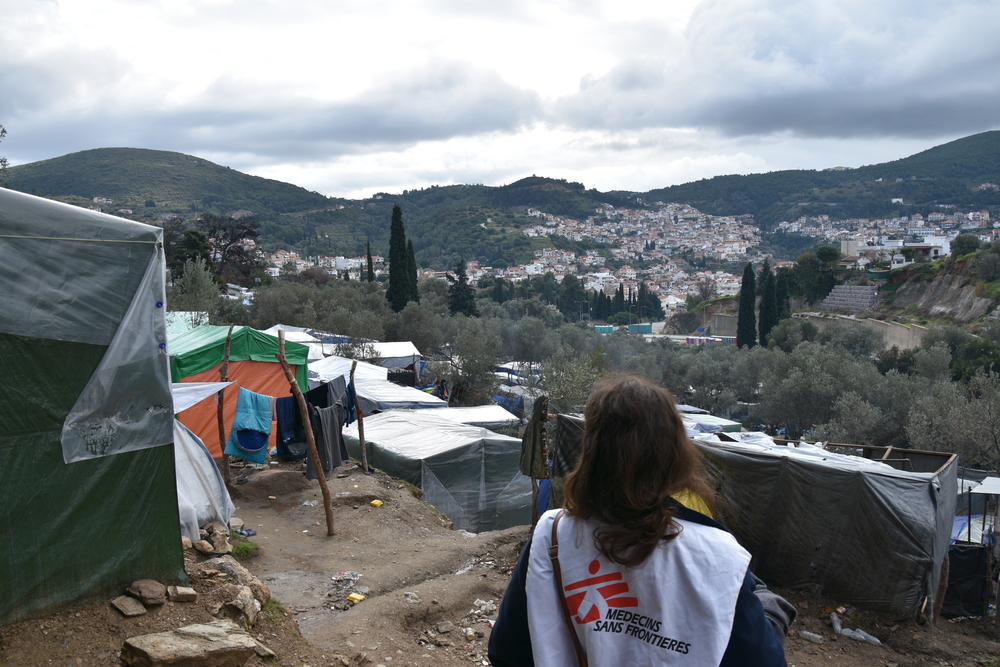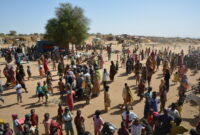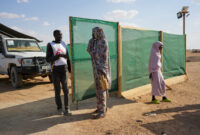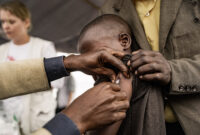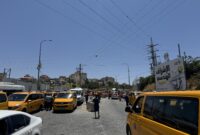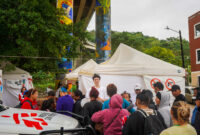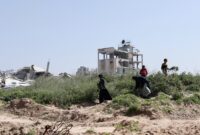A “Shield” of Violence: Europe’s latest dangerous response to migrants
Two weeks before the fourth anniversary of the adoption of the EU-Turkey Statement, European leaders once again declared a crisis at Europe’s external border. On February 27, Turkish authorities announced that people would no longer be stopped from leaving Turkey to reach the European Union. As a response, the Greek Government introduced emergency measures and quickly reinforced its border with police, army and special forces, and sought greater support from the European Border and Coast Guard Agency (FRONTEX). Doctors Without Borders/Médecins Sans Frontières (MSF) continuously works closely with people seeking safety.
Thousands of people are currently trapped near the land border in Northern Greece, where they were met with tear gas and gun shots. Over in the Aegean Sea, a child died in a shipwreck off the coast of Lesvos. Greek authorities reportedly delayed assistance to boats in distress and boats carrying men, women and children were attacked by masked men, deliberately putting lives at risk.
Now more than ever, people who are looking to Europe for protection from violence, conflict or extreme hardship find anything but safety.
Why exactly is all this happening and what does it mean?
Greece’s State of Emergency: Criminalizing asylum
On March 1, the Greek Government announced emergency measures temporarily suspending the right to apply for asylum for people entering the country, speedy deportations of new arrivals without registration, and reinforcement of the border through deployment of additional military and security personnel. This was reinforced a couple of days later when the EU President Ursula von der Leyen called Greece the “shield” of Europe after announcing that Greece will receive an extra 700 million euros for border management, infrastructure and stepping up returns.
Those arriving after March 1, 2020 will reportedly be transferred to closed detention facilities or held in prisons. They will not be transferred to the reception and identification facilities (RIC). The Government has said that families will not be separated, so children will also be detained. People who arrived to the Greek Islands after this date have been contained in the islands’ ports with no access to basic services, waiting to be sent to detention facilities to be processed for deportation.
These are some of the most restrictive and punitive measures against people seeking protection in the world; essentially the new emergency measures have criminalized those seeking asylum in Greece, denied them of any pathways to protection and may ultimately push people back into harm’s way.
Keep them out! Border control, at all cost
“This past week, the Greek Government and EU leaders have been more concerned with border control than protection of human lives”, said Reem Mussa, MSF’s Humanitarian Advisor for migration. Last weekend MSF teams in Lesvos met people who reported being stranded at sea for 16 hours, repeatedly attacked by masked men who tampered with the boat, making dangerous sea crossings even more treacherous, as coastguard forces simply watched on. In Samos, MSF health promoters met people separated from their family members, they reported harassment and threats from Greek coastguards, allegedly pointed a gun at a boat full of children, women and men. Not only are these reports extremely concerning, the lack of scrutiny from EU leaders is deafening. All measures need to be immediately taken to put an end to violence against migrants and refugees.”
On March 3, the European Union’s most senior leaders flew over the Greek–Turkish border in a military helicopter. The European Commission President Ursula von der Leyen stated that “our priority is making sure that order is maintained at the Greek external border, which is also a European border”. Initially there was no denunciation or concerns expressed on the escalation of violence, the suspension of asylum and calls for basic protection of people at the border. Instead the Commission has deployed Frontex’s Rapid Intervention Team along with additional border guards, vessels, helicopters and equipment, as well financial assistance for migration management.
Following widespread criticism of EU’s silence, President von de Layen stated that it was crucial to ensure “the individual right to ask for asylum is respected”. However, Greece’s emergency measures are still in place.
On March 9, EU leaders met with President Erdogan where once again they committed to the EU-Turkey Statement, looking to address the “missing pieces” in the implantation of the deal. Once again, the EU insist on fixing a deal that has not only proved to be unstainable but also harmful. There is nothing in this deal, that can be fixed.
Disproportionate focus on border control and deterrence, for years
This situation is in fact a consequence of decisions made back in 2016 when the European Commission agreed to provide Turkey with six billion euros to keep Syrian refugees in Turkey. For those who managed to reach Europe’s shores, they would be contained on five Greek islands, called “hotspots”, to be processed under very strict asylum rules mostly aimed at returning them to Turkey or their home country.
European leaders focus on border control, deterrence and containment has undermined the development of functioning asylum and reception systems, relocation of people beyond Greece and the provision of medical assistance to those in need. This has caused immense human suffering. For years, MSF has regularly highlighted the structural violence and humanitarian consequences of this deal on people seeking protection trapped on the Greek islands. We have seen the devastating physical and mental health consequences of indefinite containment and unfair procedures.
Currently, more than 40,000 people are trapped in five island reception centers made for no more than 6,000 – that is almost 600% over capacity and conditions are horrible. more than a third are children, and yet little has been done to address this crisis.
Facing the chaos alone: vulnerable people at risk
After four years of humanitarian neglect it is clear that people seeking asylum and local communities have been abandoned by European policy makers. After the Greek Government announced the creation of new closed centres on the Greek islands rather than evacuating people from existing RICs, local tensions reached breaking point, which in turn led to riots, roadblocks, arson and xenophobic attacks on asylum seekers and those providing them with assistance.
“We are concerned about the violent incidents that have taken place” said Marco Sandrone, MSF Project Coordinator in Lesvos. “Many organizations have had to scale down or leave the island. We find ourselves negotiating access to be able to provide care. Disruptions to our medical activities means that that children in Moria will have decreased access to medical care, mental health patients and patients with chronic conditions may not be able to receive their medication, putting an already vulnerable population even more at risk.”
In Lesvos, some volunteers providing essential support for people rescued at sea and those living in Moria RIC have had to leave the island because of the violence. As for MSF, teams are constantly evaluating the security situation and adapting their activities. MSF and other organizations continue to provide the bulk of assistance including primary healthcare for children and other vulnerable people in the hotspots on Lesvos and Samos islands. If organizations are forced to leave the island or scale down their activities, the impact on people seeking asylum will be devastating, potentially leaving 20,000 people with little to no humanitarian assistance.
Address the real humanitarian crisis
The European Union migration policies are the cause of the deteriorating situation in Greece. Criminalizing and demonizing those looking to Europe for protection will not solve it. Europe must address the real humanitarian crisis on the Greek islands. More than 40,000 people are living in slum-like conditions, many denied medical care for severe chronic illnesses or mental health conditions. They must be evacuated now.
The EU must adopt policies that protect human lives and minimise health and humanitarian risks. Migration of people seeking safety and a better life across borders is a reality. EU migration policies must uphold human dignity. A common EU asylum system must be facilitated along with the reinforcement of protection pathways and the provision of accessible and adapted health services.
These are human beings we are talking about. Not numbers to be tallied, commodities to be traded, or threats to be driven back into the sea.
